
|
|
In Memory's Eye
(Part 5) Honourable Members
Most modern electronic audio equipment have it, and indeed old-fashioned battery operated radio sets had it, the "it" being a device to modulate volume, ranging from very low, through medium, and on to high. I often thought that some Members of Parliament should have been fitted with such a tuning knob or button in an era when the Commons Chamber lacked any but the most rudimentary sound system. Microphones were suspended from on high, at fixed intervals, and if a soft voiced Member happened to be seated at a distance from one of them, it was a heck of a job to hear him. Sometimes the system operators were slow to switch on a dead microphone, and even the Speaker might find himself missing amplification at vital moments. As the years passed many improvements were made, and now each Member has a microphone on the desk in front of him or her. Three members in particular did not require any mechanical aid to make themselves heard, Ralph Cowan, Ray Perrault, and Eldon Woolliams.
Cowan and Perrault were Liberals, Woolliams a Conservative. Cowan represented a Toronto constituency, Perrault hailed from British Columbia, and Woolliams was the member for Bow River in Alberta. Cowan held a managing position on the distribution staff of a daily newspaper, Perrault was an advertising and public relations consultant, and Woolliams was a barrister. Cowan barked, Perrault bellowed, and Woolliams boomed, easily out throating his two rivals in decibels. There was never any need to ask who was speaking when Woolliams held the floor. He could easily be heard on third floor corridors at distances of twenty, thirty or more yards from the doors to the public galleries. The Hansard offices were that distance away, and to what I write I can attest. It might seem that the loudly barking, bellowing, booming trio were the answer to a Hansard reporter's prayer, members who could at least be heard, but sometimes a prayer is answered in spades, and a loud, loud voice can have a jarring effect on the sensitive link between ear, brain, arm, hand, and fingers wielding pens writing shorthand or tapping silently on stenotype keys. Cowan's time in Parliament was short, Perrault became a Senator, our gift to the Senate Hansard reporters, and Woolliams returned to Calgary where he was an outspoken spokesman for the oil industry.
He qualified as a barrister in 1941, and that same year joined the Royal Canadian Navy in which he served throughout the years of World War II, rejoining civil life in 1945. He was a man with a heart and a conscience. Before his arrival in Ottawa he served as Secretary of the Québec Commission on the Rights of Married Women, and as Secretary of the Québec Commission on Juvenile Delinquency. He was first elected to the House of Commons in 1949, and re-elected in 1953, 1957, 1958, 1962, and 1963. Such electoral successes and his own unquestionable talents warranted recognition, and in 1957 he gained a seat in the Cabinet of Prime Minister Diefenbaker as Solicitor General, and later in 1960 as Minister of Transport. There was one position that Diefenbaker denied him, that of his Québec lieutenant, a seemingly nominal appointment but one which meant a lot in the political climate of the times. Had he been made political minister with responsibility for Québec, he might have saved his party's long years spent in Opposition through the Trudeau era, but Diefenbaker disliked delegating responsibility. Balcer served him without publicly complaining, but finally was driven to part company with him on a matter of principle. The story of Léon Balcer yet remains to be told in full. His service to province and country should never be forgotten.
A number of things set him aside from the run of western members in the years before the advent of cohesive groups advocating parliamentary reform, such as the Reform Party headed by Preston Manning, and its successor, the Canadian Alliance Party, and its leader, Stephen Harper. The Standing Orders of the House were not the most popular item on the agenda of those who first elected him to represent their interests in Ottawa in 1958. They did, however, respect the stand he took when seeking to modernize them, and re-elected him general election after general election. Jed Baldwin was a tall, well physiqued figure, a plain spoken, mannerly individual who never raised his voice to overwhelm, content to let the soundness of his arguments sway his colleagues. He had the somewhat unusual claim to being born in the southern latitudes, New Zealand to be precise, in 1907, but grew up and was educated in Canada where he entered the legal profession as a barrister. Jed Baldwin served Canada in war in peace. During World War II he was a member of the Royal Canadian Air Force and served overseas in England and Europe. With his legal training, military discipline, and inward self-conviction, he was an ideal parliamentarian who took to life in the Commons as the natural environment in which he could best exercise his talents. He got along with members in all parties, and over time came to be regarded as one of the finest minds dealing with the seemingly arcane mysteries of parliamentary rules of procedure.
The Honourable William Moore Benedickson (Kenora-Rainy River) was one of the most agreeable, affable men in the Commons of his time. He was handsome, no doubt a tribute to his Icelandic and Canadian heritage, and had a distinguished war record, rising to the rank of Wing-Commander in the Royal Canadian Air Force. He was first elected a Member of Parliament in 1945, and won re-election in six more successive general elections. As spouse and helpmate he was fortunate in having won the hand of Agnes Richardson, a member of the prominent Richardson family of Winnipeg. As a war veteran he shared with many of his colleagues in Parliament that tie which bound together those who had risked all in defence of Canada and of the western democracies against attack by the combined forces of nazism and fascism. One of his earliest stints as a parliamentary assistant was with the legendary Douglas Abbott, Minister of Finance in the cabinets of Mackenzie King and Louis St. Laurent In 1963 he himself joined the cabinet of Lester Pearson as Minister of Mines and Technical Surveys, and two years later was appointed a Senator. Bill Benedickson, a Liberal in all but name, carried with him the rather singular party designation of Liberal-Labour during his many years in Parliament. It was a mark of independence, of the man, of his background, of his thinking, and in no way hindered his advancement politically and otherwise. No mention of his services can be complete without reference to the life-long commitment of his wife, the aforementioned Agnes, in support of education, the arts, and charities, in Canada and elsewhere.
He had attained the status of elder party counsellor by the time I first started reporting his speeches and interjections in debate in the House of Commons. He was a gruff, outspoken man, bald headed except for a circling white fringe of hair, and given to choleric, fiery outbursts at what he deemed the dastardly conduct of members of other political parties. He had earned the right to speak his mind. In World War I, "the war to end all wars", he served in Europe as a Vickers machine gunner, beginning in 1916 as an 18 years old volunteer, and in World War II, at age 41, he answered the call to arms again, this time with the Fort Garry Horse and later as Commanding Officer of the 1st Canadian Armoured Regiment in northwest Europe. Gordon Churchill took his place in the political life of Manitoba where he was first elected to the provincial legislature as an Army Representative, and sat as an Independent from 1946 to 1949. From 1951 to 1968 he sat as the Member of Parliament for Winnipeg South Centre, one of the longer serving members in the House of Commons in an era when a lifelong career in national politics was regarded as a very honourable occupation, unlike the in-and-out two-term politicians of later years. In 1957, when the Progressive Conservative Party finally regained office, after an interval of twenty-two years since 1935 when R. B. Bennett was Prime Minister, Gordon Churchill became Minister of Trade and Commerce in Diefenbaker's first cabinet, and later held the posts of Minister of Veterans Affairs and Minister of National Defence. Doughty fighter in war and peace, he had a personal code of honour which he upheld even to the extent of opposing Diefenbaker and assisting to precipitate the general election of 1963 which once more condemned the Progressive Conservatives to the role of Official Opposition for many years. Gordon Churchill fought the good fight, fought hard and cleanly, and both country and party have reason to celebrate his life and his deeds.
Two more different personalities could scarcely be imagined. Clancy was an outgoing, hail fellow well met type. A qualified pharmacist, and a member of the Progressive Conservative Party, he did not become a Member of Parliament until winning a seat in the 1958 General Election. From then on he was destined to sit as a backbencher, a loyal foot soldier in the political trenches, observing the foibles of others and occasionally contributing his own. Drummond Clancy will forever be remembered in the annals of Hansard for one unforgettable statement. When divisions were called it was the custom that, where a member in one party might be absent for good and legitimate reason, a member of another party, all present and correct, was paired with the absentee and did not take any part in the roll call voting. Usually this applied only in cases where the fate of a government did not hinge on the outcome of the division. It was a mechanism that party whips found useful, and the pairing bore all the hallmarks of a gentlemen's agreement. When a vote was recorded and the decision was announced from the Chair, it was normal for anyone who had been paired with an absent member to rise and announce that fact. Came the day when Drummond Clancy was paired with one such absentee. "Mr. Speaker," he announced, "I was paired with the Honourable Member for"-giving the name of that member's constituency. "Had I voted, I would have abstained!" Some still find it mind boggling. I had intended to query what he meant, but was unable to do so before he left politics, left Canada, and with his family emigrated to Australia. "Had I voted, I would have abstained!" It defies elucidation.
Solely from the perspective of Hansard reporters, we lamented the loss of some good speakers from Parliament, and wondered about those who had won seats for the first time. Abruptly we were startled to hear a new voice. One of the newcomers was being interviewed, a Québecer, about whom we knew nothing. He was speaking English. Not only was he masterfully fluent, but the words he spoke were delivered with machine gun velocity. We realised at once that we would need to be fully alert when it fell our lot to take down his speeches in shorthand whenever he addressed the House. The new man was Réal Caouette, the Member for Temiskamingue, who flashed across the political scene like a comet, and left it all too quickly after an electrifying career. If populist could define anyone exactly, that person was Caouette. He had a personal magnetism that drew attention wherever and whenever he spoke. And he was sincere in what he said. The social credit theories of Major Douglas, a Scot and a student of economics, had been embraced with enthusiasm by followers in many parts of the globe. They particularly appealed to the disadvantaged and those who had suffered the most in the Depression years of the 1930s. Western Canada was fertile ground, and Social Credit leaders like William Aberhart drew huge support in Alberta. Bob Thompson was the one to bring Social Credit to the fore in federal politics, and Réal Caouette was his Québec lieutenant. At least it started out that way. But Caouette soon described himself as co-leader of the party, and over time eclipsed Thompson by sheer charisma. This was long before that quality was most eagerly sought in would-be political leaders, culminating in its almost copyright attachment to Pierre Elliot Trudeau, the spectacular new-style Prime Minister who succeeded Lester Pearson. In time Caouette and Thompson parted company, Caouette to found the Creditiste Party confined to Québec, and Thompson to struggle on as head of the depleted Social Credit Party in Ottawa. Old fashioned descriptions of Réal Caouette by political commentators of the day talked about "the firebrand from Québec", whose speeches were "barn burners". They were scintillating, and sincere. Caouette was not a Québec separatist. He had an intense love of Canada, and his Canada extended "from sea to sea to sea", a phrase he often used, thus bringing Canadian sovereignty in the Arctic into the public consciousness of new generations. It was hard, if not impossible, to find anyone who was not touched by his presence during his years in Ottawa. Some few words may have inflicted hurt on others, but the geniality of the man belied any personal animosity to those who were so offended. His rapid manner of speaking made those who reported him work hard, but he brightened their day, and he enlivened proceedings at a time when the House of Commons lacked sparkle and was the preserve of the dull and dreary. Those who knew him, who saw him, who heard him, will not forget Réal Caouette.
That he was earnest and well-meaning was evident to political friend and foe alike, but where he drew his inner strength from remained hidden from public view. He did have one unique, almost unbelievable distinction for a Canadian, for a westerner at that, indeed for a white male Caucasian. He befriended royalty. Somewhere along his path he became a teacher to the young family of a king, and not just any king, an Emperor! The Lion of Judah, with a lineage going back a thousand years, was one of the most tragic figures in twentieth century world history. Emperor of Abyssinia, he first fell victim to the Italian dictator, Benito Mussolini, whose army and air force ravaged his country as a prelude to becoming a partner of Adolph Hitler, the Nazi German dictator who waged war on Poland, France, Belgium, Holland, Russia, and other nations, including Britain and United States of America. Helai Selassi was a man of singularly small stature among world leaders of his day. The victim of a bully armed with powerful planes and tanks, he was isolated, and he earned the sympathy of other peoples in countries that were members of the League of Nations, that international body set up after World War I to safeguard world peace and end international aggression. Sympathy was all Selassi and his people received from the League of Nations. Not to recapitulate all the history leading to the overthrow of the House of Selassi, suffice it to say that Bob Thompson was entrusted with the safety of some of the royal children, and oversaw their education and political refuge far from their native Abyssinia. Thompson was held in the highest esteem by his constituents. He was known to everyone. I vividly recall being besieged for tales of his doings in Ottawa by patrons of an hotel beer parlour in Three Hills, where I spent my honeymoon. I mean the town, not the beer parlour. "What in under-" Don't ask. I did. They asked about him, eager to know how their man was regarded in far off Ottawa. His farm was pointed out to me, as well as the three hills. I also visited Two Hills, another town not so far away, and later some big hills in the far distance called the Rockies. Bob Thompson did many good things during his lifetime. One of them was the now unremembered caring face he gave Canada and Canadians by the compassion and concern he showed for the children of the Emperor of Abyssinia, the Lion of Judah. Now to answer the interrupted question. A honeymoon can be a highly educational experience. How else could I have gained the knowledge I possess? Now I know that Three Hills is in the midst of the Canadian Bible Belt and houses no fewer than three Bible colleges or schools.
Untried, unproven, largely unknown outside a well cultivated "circle of friends", he was to place his stamp on Canadian politics, and on Canada itself, during the nine years he presided as master of the Progressive Conservative Party, leading it to two consecutive majority governments in the General Elections of 1982 and 1987. Having observed the loosely reined ministers of Diefenbaker bringing "the Old Chief" down, he was determined to avoid a similar fate. A succession of foul-ups by ministers during his first years in office saw those ministers fired on the spot. As the years passed, there was never any question about who was in control. Mulroney ruled. In the Chamber his mellow, fine tuned voice was a delight to those of us charged with the task of reporting the debates. Fluent and at ease in both official languages, for a time he dazzled political friend and foe. After some time the voice yielded to the tongue. If there was a bridge too far, Mulroney reached for it. An added phrase, an excess of verbiage led him into pitfalls and bog holes that a more experienced parliamentarian could have avoided. Unlike Trudeau, whose French-Scotch ancestry cooled his temperament, Mulroney's French-Irish ancestry had the opposite effect. Grown men who experienced his displeasure physically cringed. I remember seeing two members of his Cabinet wandering in a daze, pole-axed in mid career, when they were abruptly dismissed. It is much too early to chart the course, indeed courses, taken by Brian Mulroney during his reign. His craving for popularity, affection, admiration, led him in many directions. He had a conviction that he was destined to be the one to answer the question long bedevilling Canadians: "What does Québec want?" In his quest for the answer he co-opted a number of Québec separatists to his ranks, the most famous of the lot being Lucien Bouchard. Twice he convened Federal-Provincial conferences in an attempt to entice Québec to sign on to the new Canadian Constitution of 1982. Twice he failed, and unable to give his new Québec recruit what he wanted, saw Bouchard resign in a huff, return to Québec and eventually become Premier of a provincial government dedicated to establishing Québec as an independent state. Many reasons have been advanced for Mulroney's loss of popularity among the Canadian people. As a parliamentary reporter a personal observation may not come amiss. Listening to a public figure day after day, week after week, the ear grows attuned to variations in tone, senses when a strange note intrudes, and when something doesn't sound quite right. Toward the end of Mulroney's years in office that ear detected that the voice did not believe what the tongue was saying. Mulroney had lost his ability to convince others. He had even lost the ability to convince himself. From great heights he descended to great depths. His desire to be all things to all people, at one time Canadian, one time Irish, one time Québecois, led him to an extraordinary vaudeville farewell as he toured the earth seeking farewell encomiums from the world leaders of the time, a video of which was played at his final party convention. His successor paid dearly for the distrust he engendered among the voting public. The greatest stumbling block Mulroney encountered in his career was the rejection of the Meech Lake Accord which he had personally engineered as a proposed amendment to the Constitution, one which would lead to Québec's acquiescence to becoming a signatory to the Canadian Constitution Act of 1982. Followers of the negotiations will recall Mulroney exulting that the Accord "was good for Québec," adding "and good for Canada." It was another example of the phrase too far. Québec was foremost in his thinking. Two things led to its undoing. In Clyde Wells, the Premier of Newfoundland, Mulroney encountered a Canadian well versed in constitutional law who foresaw that the price to be paid for Québec acceptance was too high. By arrangement, all the Provinces had to pass legislation by a date certain in order for the Accord to be ratified. As the days passed, the arguments for rejection that Wells placed in front of the House of Assembly in St. John's had a powerful effect, not only in his own province but among people in other provinces. In Manitoba, the legislature, as with all other provinces, had its own rules and procedures governing the introduction of government sponsored motions. That led to a curious twist in the road to rejection. Unanimous consent was required for such a motion to be accepted for debate. One member refusing unanimous consent meant that the matter could not come before the legislature . Day after day the Government House Leader would seek unanimous consent. Day after day one member of the legislature, holding an eagle feather in his hand, silently refused his consent. Elijah Harper, who at the time became the strongest voice of Canada's aboriginal peoples, by his silent refusal stopped the Accord from coming before the legislature. The aboriginal peoples had long been suffering from the perceived insult in refusing them participation in the federal-provincial conference that produced the Meech Lake Accord. They saw it as the latest in such slights suffered by them at the hands of white newcomers who had ignored their inherited right in the land of their forefathers. As matters turned out, Newfoundland's House of Assembly voted to reject the Accord, and the Manitoba Legislature bowed to the eagle feather held day after day by Elijah Harper, thus ensuring its members did not have to vote on rejection or acceptance of the Accord. The final sentence at page 220 of "The Hansard Chronicles" published in 1980 to celebrate the centenary of Hansard in the Canadian House of Commons, read: There was delicious irony in the spectacle of two former Hansard reporters, Bourinot and Thompson, sitting in the Chamber within a few feet of each other, the Clerk of the House of Commons, and the Prime Minister of Canada. Who knows what Hansard has yet to offer the nation? The Government House Leader in the Manitoba legislature on that famous occasion in 1992 was the Honourable James McCrae, Minister of Justice, a former member of the Hansard reporting staff in Ottawa, whose experience in the House of Commons led him to became an acknowledged master of parliamentary procedure. When he introduced the government motion in the Manitoba legislature he was fully aware that it required unanimous consent. Mulroney, who became an instant Prime Minister without previous experience in Parliament, had either forgotten or never knew that the provincial legislatures had their own governing rules and procedures. Of such apparent trifles is history made.
Francis had a gruelling introduction to the duties of the Chair when he first acted as Deputy Speaker in 1984 when Speaker Sauvé held sway. It fell his lot to preside over the tempestuous debate that rocked the Chamber when the issue of amending the Constitution was under debate. The spectacle of one member leaving his seat and advancing on the Chair has been captured in televised recordings of the proceedings. There were angry shouts, gesticulations, general upheaval and breaches of parliamentary decorum when it came time for him to rise and "put the question" to the House, otherwise known as calling for a vote. It had been customary for the Speaker to preside on such important occasions in the past, but Madame Sauvé left it to Lloyd Francis to bear the brunt of Members' anger. Those who were present will not forget the courage Francis displayed on that occasion. It would have been so easy to adjourn the House on the grounds of unruly behaviour and hope that the more passionate Members might be persuaded in the ensuing interval to remember the dignity of Parliament, and restrain themselves. Francis held firm. Faced with fists raised, prolonged jeering and shouted insults, he stood alone on the Speaker's dais, and by sheer dint of personal determination succeeded in confirming the Speaker's right to be heard and to put the question. For that alone he deserved to sit on the Speaker's Chair in his own right when he was later elected Speaker by his colleagues in all parties. He took a personal interest in the welfare of Hansard as a functioning arm of Parliament, and in the treatment of its personnel. Many remember his consideration for the staff during all-night sittings, when trays of sandwiches were delivered to them at intervals, courtesy of Mr. Francis. Like Speaker Lamoreaux, he was awarded a minor ambassadorship following his term in office. As one who had served his native city Ottawa, and its foremost institution, the House of Commons, well and with distinction, many felt he deserved greater recognition from the government of the day. [In the next segment: Stanley Knowles, Lynn Campbell, Aideen Nicholson, Monique Bégin, Iona Campagnola, Simma Holt, Donald Stovel Macdonald, Allan McKinnon, Donald Munro, Colin Cameron, Kim Campbell (Prime Minister), John Bosley (Speaker).] --30--
Home | About | Canadian Vindicator | Literature | Gallery | History
|
||||||||||||||||||||||||||||||||||||||||||||||||||||||||||||||||||||||||||||||||||||
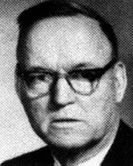
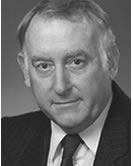
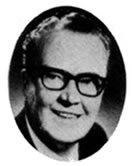
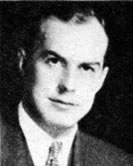 The Honourable Léon Balcer was a mild-spoken man who deserved greater recognition than he received from the PC party of which he was a stalwart supporter in his native Province of Québec in good times and in bad.
The Honourable Léon Balcer was a mild-spoken man who deserved greater recognition than he received from the PC party of which he was a stalwart supporter in his native Province of Québec in good times and in bad.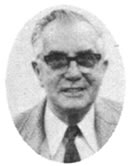 Gerald (Jed) William Baldwin, the Member for Peace River in "the high sky country" of northern Alberta, will be remembered for the many years during which he strove to improve the image and effectiveness of Parliament.
Gerald (Jed) William Baldwin, the Member for Peace River in "the high sky country" of northern Alberta, will be remembered for the many years during which he strove to improve the image and effectiveness of Parliament.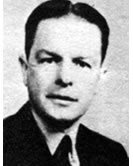 In any work dealing with the post-war House of Commons from 1945 onwards, the name Benedickson comes prominently to the fore.
In any work dealing with the post-war House of Commons from 1945 onwards, the name Benedickson comes prominently to the fore.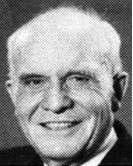 Another veteran of war who served in Diefenbaker's cabinet was the Honourable Gordon Minto Churchill (Winnipeg South Centre), a warriors' warrior, both militarily and politically.
Another veteran of war who served in Diefenbaker's cabinet was the Honourable Gordon Minto Churchill (Winnipeg South Centre), a warriors' warrior, both militarily and politically.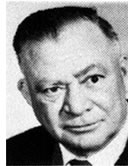 Drummond Clancy, the Saskatchewan Member for the riding of Yorkton, shared at least two things with Manitoban Churchill. His second name was Gordon, and he too had gone to war, serving in the RAF, the Royal Air Force, from 1935 to 1947. There the connection, if such it was, ended.
Drummond Clancy, the Saskatchewan Member for the riding of Yorkton, shared at least two things with Manitoban Churchill. His second name was Gordon, and he too had gone to war, serving in the RAF, the Royal Air Force, from 1935 to 1947. There the connection, if such it was, ended.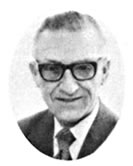 I listened to the results coming in on election day in 1963 at a friend's apartment in Vancouver, in company with another colleague, Roger White. That General Election was the one in which the fledgling federal Social Credit Party made its breakthrough under the leadership of Bob Thompson, the Member for Three Hills in the province of Alberta.
I listened to the results coming in on election day in 1963 at a friend's apartment in Vancouver, in company with another colleague, Roger White. That General Election was the one in which the fledgling federal Social Credit Party made its breakthrough under the leadership of Bob Thompson, the Member for Three Hills in the province of Alberta.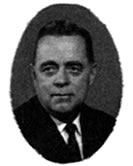 Robert Thompson, titular head of the federal Social Credit Party, is not so easy to limn. He had no prepossessing features. In memory's eye he is not tall, not short, not slight, tending more to well-fleshed than heavy set. He did not have a commanding voice, and the political fates did not deal kindly with him. He saw his party sprout, become tangled in internal divisions, and its roots shrivel and die, all within a relatively small number of years.
Robert Thompson, titular head of the federal Social Credit Party, is not so easy to limn. He had no prepossessing features. In memory's eye he is not tall, not short, not slight, tending more to well-fleshed than heavy set. He did not have a commanding voice, and the political fates did not deal kindly with him. He saw his party sprout, become tangled in internal divisions, and its roots shrivel and die, all within a relatively small number of years.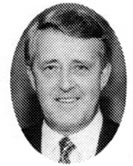 Martin Brian Mulroney was a long-time backroom operator, from his days as a university student wending his way through the Saskatchewan riding of the Hon. Alvin Hamilton as an assistant during the 1958 General Election. He made his first appearance on the floor of Commons Chamber as the Prime Minister of Canada. It was a unique debut. He hadn't served a single day as a Member of Parliament before that.
Martin Brian Mulroney was a long-time backroom operator, from his days as a university student wending his way through the Saskatchewan riding of the Hon. Alvin Hamilton as an assistant during the 1958 General Election. He made his first appearance on the floor of Commons Chamber as the Prime Minister of Canada. It was a unique debut. He hadn't served a single day as a Member of Parliament before that.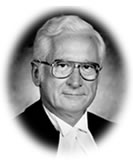 The Honourable Lloyd Francis, who became Speaker for ten months in 1984, was a native of Ottawa, Canada's capital. By profession an economist, he established a somewhat peculiar record among Canadian politicians. First elected to the Commons in 1963, he was defeated in the General Election of 1965, re-elected in 1968, defeated in 1970 and 1972, and re-elected once more in 1980. His was truly a bellweather constituency, reflecting the prevailing political winds of the times.
The Honourable Lloyd Francis, who became Speaker for ten months in 1984, was a native of Ottawa, Canada's capital. By profession an economist, he established a somewhat peculiar record among Canadian politicians. First elected to the Commons in 1963, he was defeated in the General Election of 1965, re-elected in 1968, defeated in 1970 and 1972, and re-elected once more in 1980. His was truly a bellweather constituency, reflecting the prevailing political winds of the times.